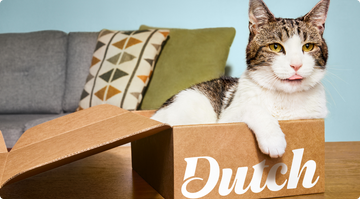Cat Seizure Medication
If your cat is experiencing seizures, it’s important to find treatment fast. Shop seizure medications from Dutch.
-

Levetiracetam ER (Extended Release) Tablets (Rx)
$26.69 / unit
Multiple options available
-

Levetiracetam Immediate Release Tablets (Rx)
$27.69 / unit
Multiple options available
-
Prescriptions without the expensive vet trip
Video chat with a vet and get new prescriptions and renewals — shipped free to you.

Frequently asked questions
What does a cat seizure look like?
What does a cat seizure look like?
When we think of seizures, we often picture the collapse and violent shaking known as a grand mal seizure. But this is just one form that seizures may come in. In reality, seizures can manifest in a range of different ways.
Grand mal seizures fall into a category known as generalized seizures. These are seizures that affect both sides of the brain at once. During a generalized seizure, a cat may experience muscle spasms, falls, twitching, urination, or defecation. Generalized seizures can last up to 3 minutes and can even occur in rapid sequence.
Seizures can also occur as partial seizures. In these instances, the seizure only affects a specific part of the brain. These seizures cause much smaller and harder to detect side effects, like drooling, twitching, or strange head and neck movements. Partial seizures are much more common in cats than they are in dogs.
What causes seizures in cats?
What causes seizures in cats?
Seizures are not an illness in and of themselves, but a symptom of an illness. They are a result of abnormal brain activity caused by an electrical impulse in the brain. These impulses trigger nerve pathways in different parts of the body, causing the bizarre behavior that we call seizures.
One primary cause of seizures is epilepsy, a disease categorized by frequent disruptions in brain activity and chronic seizures. Epilepsy is a lifelong illness and cannot be cured, but its symptoms may be managed with cat seizure medication.
Seizures may also be a symptom of other health problems, like kidney and liver disease, dramatic changes in blood sugar, poisoning, and more.
What is the best seizure medication for cats?
What is the best seizure medication for cats?
If your cat experiences a seizure, it’s important to talk to your vet. They can assess the causes of the seizure and prescribe a treatment. If the seizure is a result of another health issue, they may start by treating that health concern before prescribing a feline seizure medication.
If the seizure is a result of epilepsy or if your cat is experiencing chronic seizures, it’s likely that your vet will prescribe a cat seizure medication. It can sometimes take a bit of trial and error to find a feline seizure medication that works for your cat. Typically, the vet may prescribe a phenobarbital or Gabapentin (Rx). If that is not sufficient in quelling seizures, your vet may add a cat seizure medication like Levetiracetam ER (Extended Release) Tablets (Rx) or Levetiracetam Immediate Release Tablets (Rx).
What are the side effects of cat seizure medication?
What are the side effects of cat seizure medication?
Anti-seizure medication for cats can have associated side effects, These may include lethargy or loss or increase of appetite and resulting dramatic loss or weight gain. Anti-seizure medication for cats can also cause diarrhea and vomiting.
If you’re concerned about the side effects of seizure medication for cats, talk to your vet.
Are there any over-the-counter seizure medications for cats?
Are there any over-the-counter seizure medications for cats?
Seizure medicine for cats requires a prescription, but Dutch makes it easy to get a diagnosis and prescription with online appointments. You can fill your prescription for seizure medicine for cats with our online pet pharmacy. Dutch members get free shipping on pharmacy orders.




